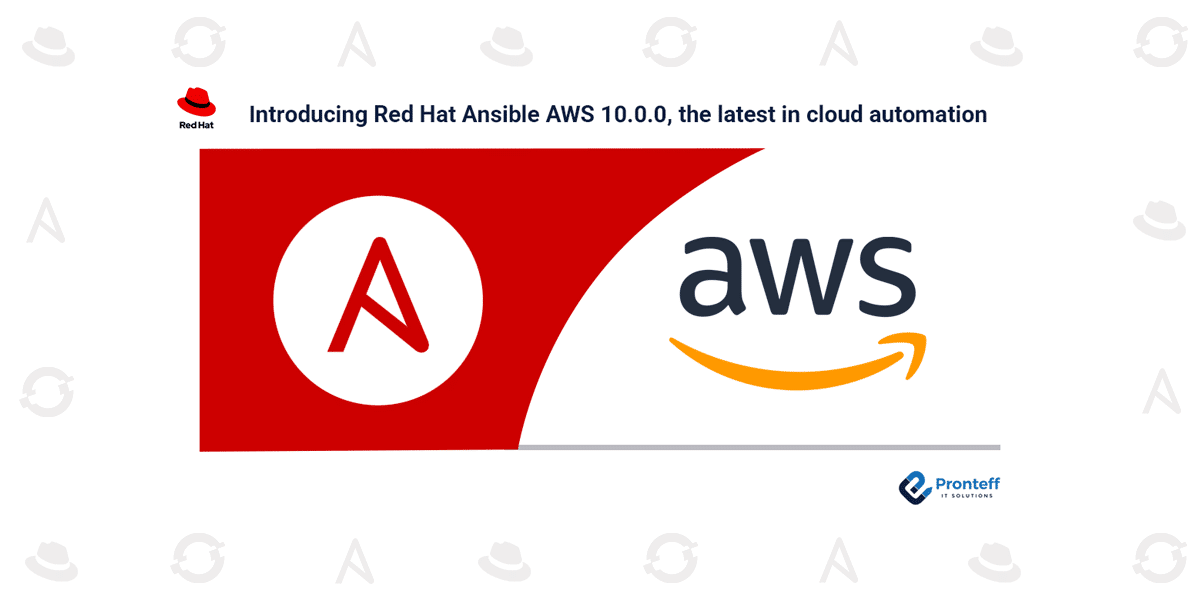Introducing Red Hat Ansible AWS 10.0.0, the latest in cloud automation
In this blog, we will learn what’s latest in cloud automation – Red Hat Ansible AWS 10.0.0.
As organizations continue to adopt cloud computing and automation on Amazon Web Services (AWS), Red Hat has released version 10.0.0 of the Ansible Certified Content Collection for Amazon. AWS. This update introduces a variety of enhancements aimed at simplifying workflows, strengthening security, and improving reliability—helping teams move from development to production with greater speed and confidence.
Below is a detailed look at the most important changes, features, and updates in this release.
Key Enhancements and Updates
Better Error Handling for Amazon S3
This release brings several improvements to the S3 modules and utilities, making automation more stable and easier to troubleshoot:
- Support for HTTP 501 errors: The
module_utils.s3utility now correctly detects and manages the501 Not Implementederror, allowing tasks to fail gracefully when an unsupported operation is attempted. - Centralized ErrorHandler: A new, foundational ErrorHandler has been introduced for S3 bucket modules to ensure consistent error reporting and reduce ambiguity.
- Refactored
s3_bucketmodule: This module now uses the centralized ErrorHandler, improving error detection and simplifying debugging across both AWS and non-AWS-related issues.
These changes improve clarity and resilience when automating S3-related tasks.
New Connection Plug-in: aws_ssm
One of the most significant upgrades in 10.0.0 is the promotion of the aws_ssm connection plug-in to full Red Hat support. This plug-in enables connections to EC2 instances through AWS Systems Manager (SSM), removing the need for SSH or public IP addresses.
Key benefits include:
- Secure, agent-based connections that align with modern compliance standards.
- Simplified access to instances in private VPCs or behind firewalls.
- Reduced credential management by eliminating SSH key pairs.
This is a strong security-focused alternative for organizations that prefer network-isolated, agent-driven automation.
Updated Support Policies
To ensure alignment with current AWS and Red Hat standards, several support policies have been revised:
- Ansible Core: Support for versions below 2.17 has been dropped. Upgrading is required for compatibility.
- AWS SDKs: The collection now requires
boto3andbotocoreversion 1.34.0 or higher. Older versions may still work but are not officially tested. - Python Versions: Following AWS’s retirement of Python 3.7 support, this release officially removes support for Python versions below 3.8.
These updates help maintain security, stability, and long-term maintainability.
Breaking Changes
Several previously deprecated items have now been fully removed:
| Module/Item | Change | Replacement |
|---|---|---|
rds_instance_param_group |
Old name rds_param_group removed |
Use rds_instance_param_group |
ec2_vpc_peering_info |
Deprecated return key removed | Use vpc_peering_connections |
Deprecated environment variables (e.g., EC2_ACCESS_KEY, EC2_SECRET_KEY, EC2_REGION) |
Fully removed | Use AWS_ACCESS_KEY_ID, AWS_SECRET_ACCESS_KEY, AWS_REGION |
Parameter aliases (e.g., ec2_url, boto_profile, security_token) |
Fully removed | Use modern equivalents such as endpoint_url, profile, session_token |
Developers using custom modules or legacy aliases should update their playbooks to match the new naming standards.
Developer-Focused Improvements
- Removed deprecated doc fragments: Several outdated fragments
doc_fragmentshave been eliminated to streamline module documentation. - Cleaned-up module_utils parameters: Redundant
boto3parameters have been removed from various helper functions. - Code quality upgrades: The collection now uses ansible-lint 25.1.2, improving validation, best practice enforcement, and formatting consistency.
Compatibility with Ansible Core 2.19
This release has been tested against Ansible Core 2.19, which introduces the new Data Tagging feature and major updates to the Jinja2 templating engine. Early testing helped identify and resolve potential regressions, ensuring that users can adopt Ansible 2.19 with minimal disruption to their automation workflows.
Final Takeaway
The Amazon.aws 10.0.0 release marks a significant step forward for AWS automation with Ansible. With improved S3 error handling, a fully supported aws_ssm plug-in, updated dependencies, and stricter security policies, this version offers a more modern and reliable automation experience.
Users are encouraged to:
- Upgrade to the latest Ansible Core and AWS SDK versions.
- Review playbooks for deprecated modules, aliases, and parameters.
- Explore the new
aws_ssmconnection method to enhance security and scalability.
Future updates will showcase real-world use cases for the aws_ssm plug-in and deeper insights into leveraging these enhancements in enterprise environments.








